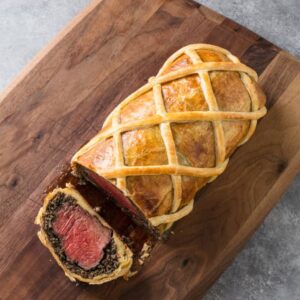 The story of Beef Wellington weaves together culinary artistry, British nobility, and French technique into one of gastronomy’s most impressive creations. This legendary dish – featuring beef tenderloin wrapped in mushroom duxelles, prosciutto, and golden puff pastry – represents the pinnacle of refined British cuisine.
The story of Beef Wellington weaves together culinary artistry, British nobility, and French technique into one of gastronomy’s most impressive creations. This legendary dish – featuring beef tenderloin wrapped in mushroom duxelles, prosciutto, and golden puff pastry – represents the pinnacle of refined British cuisine.
While many associate the dish with England’s Duke of Wellington, who famously defeated Napoleon at Waterloo in 1815, the true origins remain deliciously unclear. Some food historians argue the dish bears little connection to the Duke himself, suggesting instead that it emerged during the early 1900s. The first recorded recipe appeared in the Los Angeles Times in 1903, and it gradually gained prominence in upper-class British households during the early 20th century.
The dish’s composition reflects the sophisticated marriage of French culinary techniques with British sensibilities. The mushroom duxelles – a finely chopped mixture of mushrooms, shallots, and herbs – comes directly from French cuisine, while beef tenderloin celebrates Britain’s love affair with premium cuts of meat. Adding puff pastry, another French innovation, transforms the dish into an elegant centerpiece worthy of any aristocrat’s table.
Modern interpretations often include innovations like chicken liver pâté, crepe layers to prevent sogginess or creative twists on the traditional mushroom filling. Celebrity chef Gordon Ramsay has particularly championed Beef Wellington, making it his signature dish and introducing it to new generations through his restaurants and television appearances.
Today, Beef Wellington remains a symbol of culinary excellence, requiring skill, patience, and precision to execute perfectly. Whether served at high-end restaurants or attempted by ambitious home cooks, this magnificent dish continues to captivate food lovers with its perfect balance of textures and flavors, proving that some culinary classics truly are timeless.
Classic Beef Wellington
Ingredients
- 4 lb. beef tenderloin center-cut Châteaubriand 3 to 4 pounds trimmed weight, about 12 inches long and 4 inches in diameter, trimmed and tied by butcher*
- 2 tbsp. olive oil
- 2 tsp. table salt
- 2 tsp. ground black pepper
- 5 ounces fine pâté mashed until smooth
- 2 tbsp. unbleached all-purpose flour for dusting work surface
- 1 pound puff pastry preferably homemade (see note)
- 1 large egg
Duxelles
- 1 pound button mushrooms brushed of dirt and broken in rough pieces by hand
- 3 tbsp. unsalted butter
- 2 - 3 large shallots minced (about 1/2 cup)
- 2 tbsp. heavy cream
- 1 tsp. Madeira optional
- 1 tsp. table salt
- ½ tsp. ground black pepper
- 1 tbsp. minced fresh thyme leaves
Red Wine Sauce
- 2 ½ pounds beef oxtails trimmed of excess fat
- 2 medium carrots chopped into 1-inch pieces (about 1 cup)
- 2 medium celery chopped into 1-inch pieces (about 1 cup)
- 4 small onions chopped coarse (about 3 cups)
- 1 head garlic broken into cloves, unpeeled
- 2 tsp. tomato paste
- 1 bottle red wine 750ml
- 4 - 6 large shallots minced (about 1 cup)
- 1 medium bay leaf
- 10 sprigs fresh thyme
- 14.5 ounces low-sodium beef broth
- 14.5 ounces low-sodium chicken broth
- 1 tsp. whole black peppercorns
- 6 stems parsley
- ¼ cup ruby port
- 4 tbsp. unsalted butter cold cut into 4 pieces
- Salt and ground black pepper
Instructions
For the Beef
- Place roast on wire rack set above rimmed baking sheet and refrigerate, uncovered, for 48 hours.
- Heat 12-inch heavy-bottomed skillet over high heat until very hot, about 4 minutes. Meanwhile, rub tenderloin with oil, then sprinkle with salt and pepper and lightly rub into meat.
- Set tenderloin in hot skillet, curving it to fit if necessary, and sear on first side without moving, until well-browned, about 1 minute, pressing down on meat so that bottom of roast makes full contact with pan. Using tongs, rotate tenderloin and brown on all sides, about 1 minute per side. Remove from skillet and wrap hot tenderloin tightly in plastic wrap and refrigerate at least 4 hours or up to 24 hours.
- Unwrap tenderloin and cut off and discard twine. Using small spatula, spread pâté over top and sides of tenderloin; set aside.
- Dust a large sheet of parchment paper with flour. Unwrap puff pastry and place on parchment; dust puff pastry lightly with flour and cover with second large sheet of parchment. Roll into 12 by 15-inch rectangle, mending cracks as you roll. Remove top sheet of parchment and with sharp knife trim two 1-inch bands off long side to form 10 by 15-inch rectangle; refrigerate bands on parchment-lined plate. (If dough is soft and sticky or tears easily, slide parchment with pastry onto baking sheet and freeze until firm, about 10 minutes.)
- Line rimmed baking sheet with parchment paper and spray lightly with nonstick cooking spray; set aside. Beat egg with 1 tablespoon water; set aside.
- Remove plastic wrap from duxelles (see section below). Invert duxelles onto puff pastry; peel off parchment. Place tenderloin pâté-side down onto duxelles-covered dough. Brush edges of dough lightly with beaten egg. Following illustrations 5 and 6, incase tenderloin in dough, wrapping tightly. (There should be about 1-inch overlap forming seam; if overlap is excessive, trim with scissors.) Carefully invert dough-wrapped tenderloin onto prepared baking sheet and brush dough lightly with beaten egg; refrigerate, uncovered, 30 minutes.
- Adjust oven rack to lowest position and heat oven to 450 degrees. Bake Wellington until light golden brown, about 15 minutes, then arrange decorative ribbons on top. Continue to bake until deep golden brown and instant-read thermometer inserted into center registers between 113 and 115 degrees for rare, about 15 minutes, or around 120 degrees for medium-rare, about 20 minutes. Let stand 10 minutes, transfer to carving platter, and cut crosswise into 1/2-inch slices. Serve with sauce (see Red Wine Sauce for Beef Wellington, below).
For the Duxelles
- Process half of mushrooms in food processor until chopped uniformly fine, about ten 1-second pulses, stopping to scrape down bowl after 5 pulses (mushrooms should not be ground so fine as to release liquid). Transfer chopped mushrooms to medium bowl and repeat to chop remaining mushrooms.
- Heat butter in 12-inch skillet over medium-low heat until foaming; add shallots and cook, stirring frequently, until softened, 3 to 5 minutes. Stir in mushrooms, increase heat to medium-high, and cook, stirring frequently, until most of liquid given off by mushrooms has evaporated, 7 to 10 minutes. Add cream, Madeira, salt, and pepper; cook until mixture is dry, about 3 minutes longer. Off heat, stir in thyme.
- Line rimmed baking sheet with parchment paper; turn duxelles onto baking sheet and, with rubber spatula, spread into 8 by 10-inch rectangle of even thickness.Cover flush with plastic wrap and refrigerate until completely cold, at least 2 hours or up to 24.
For the Red Wine Sauce
- Adjust oven rack to lower-middle position and heat oven to 450 degrees. Combine oxtails, carrots, celery, onions, and garlic in large flameproof roasting pan; spray lightly with cooking spray and toss to combine.Roast, stirring every 10 minutes, until beef and vegetables are well-browned, 40 to 50 minutes, adding tomato paste to roasting pan after 30 minutes.
- While oxtails and vegetables roast, bring wine, shallots, bay leaf, and thyme to simmer over medium heat in heavy-bottomed 8-quart stockpot or Dutch oven; reduce heat to low, and simmer slowly, uncovered, until reduced to about 11/2 cups, about 30 minutes. Set pot aside.
- Place roasting pan over burner(s) set at high; add beef and chicken broths and bring to boil, scraping up browned bits on bottom of pan with wooden spoon.
- Transfer contents of roasting pan to stockpot with wine reduction. Add 7 cups water, peppercorns, and parsley stems, and bring to boil over high heat; reduce heat to low and simmer, uncovered, until richly flavored and full-bodied, 3 to 4 hours. Strain broth into large glass measuring cup or container (you should have about 2 cups), discarding solids in strainer. Cool to room temperature; cover with plastic wrap, and refrigerate at least 1 hour or up to 2 days.
- While beef Wellington bakes, skim hardened fat from surface of stock using soup spoon and discard. Transfer stock to small saucepan and simmer over medium-low heat until reduced to about 1 cup, 10 to 15 minutes. Add port; set aside off heat.
- While beef Wellington rests, return broth to simmer over medium heat and whisk in butter 1 piece at a time. Season sauce to taste with salt and pepper and serve with beef Wellington.

